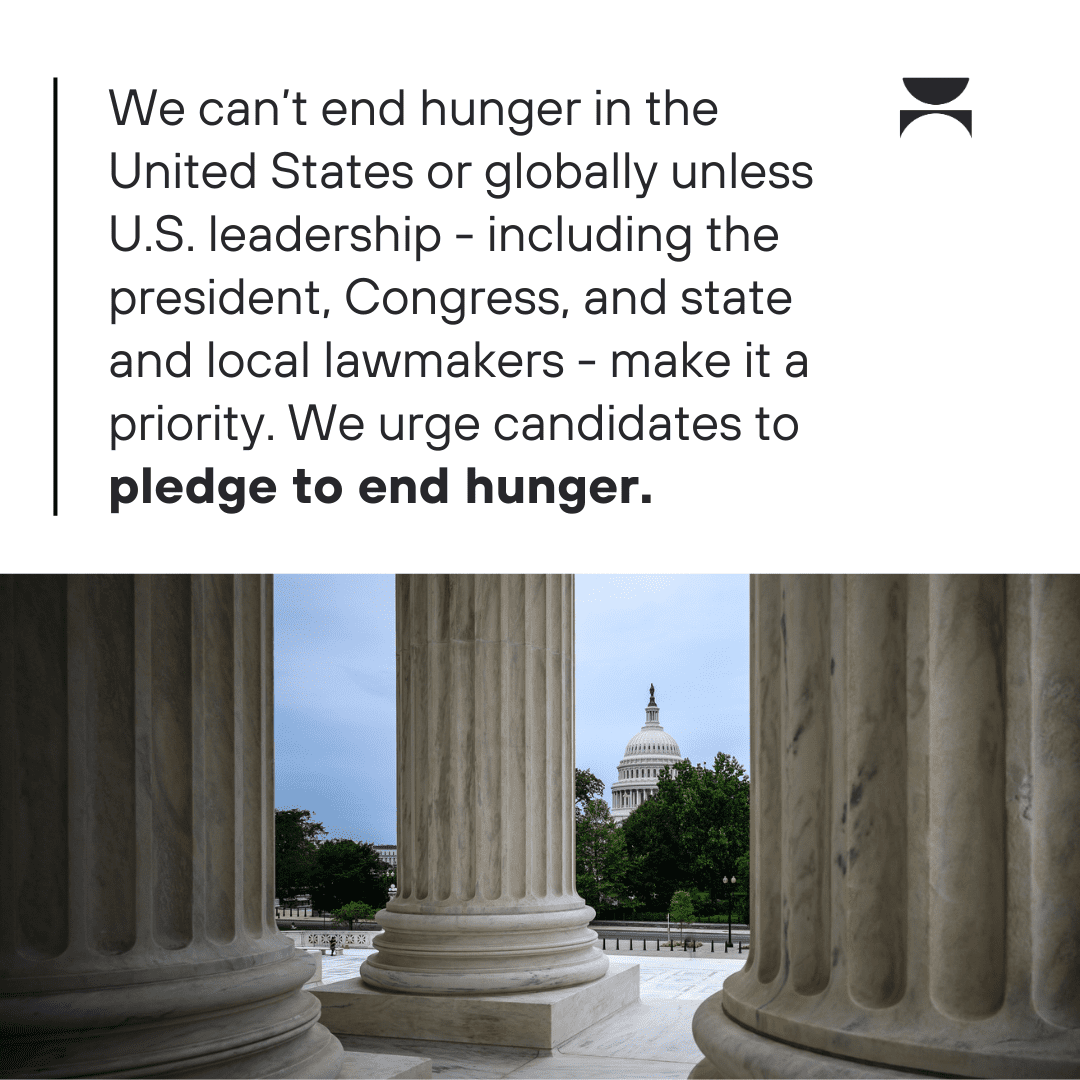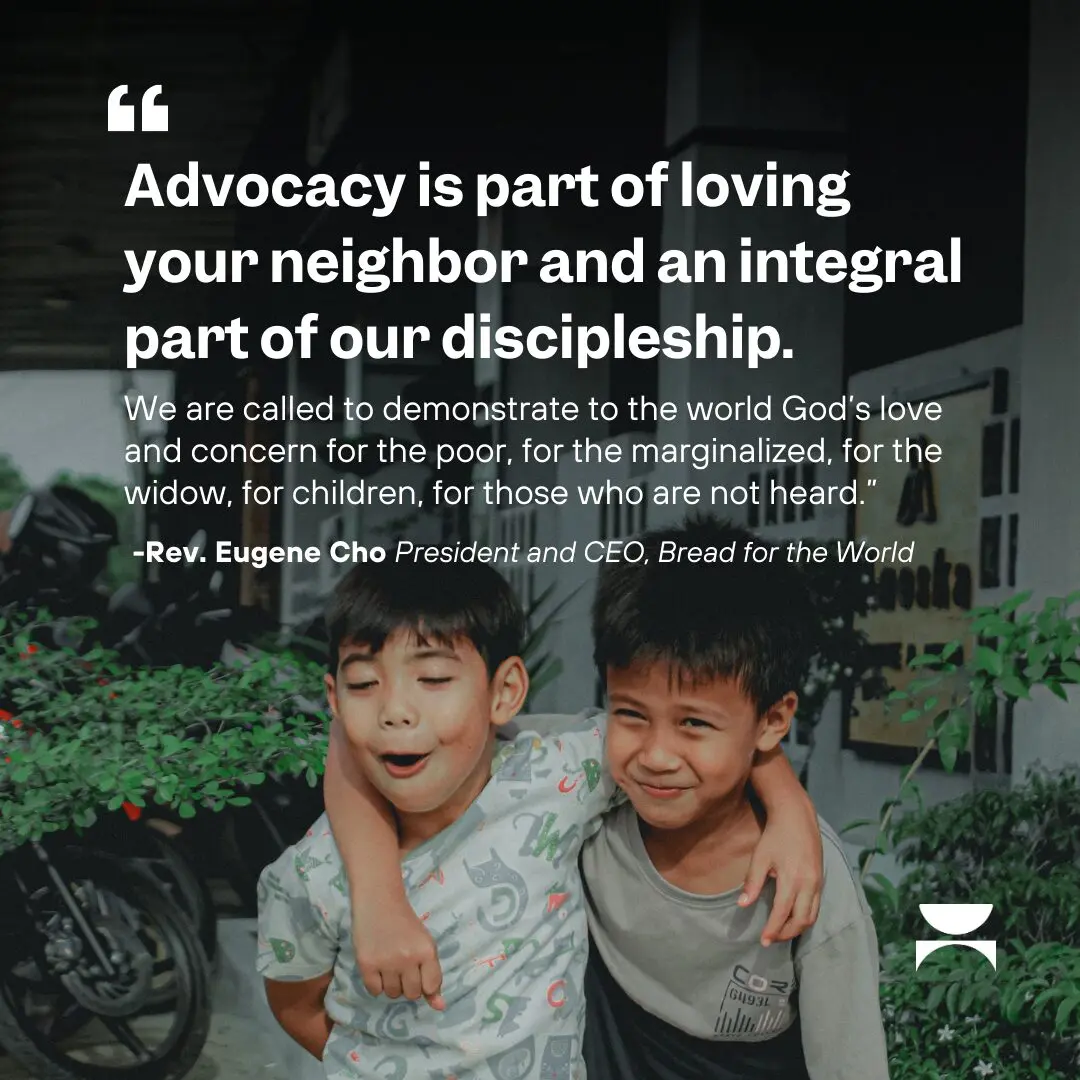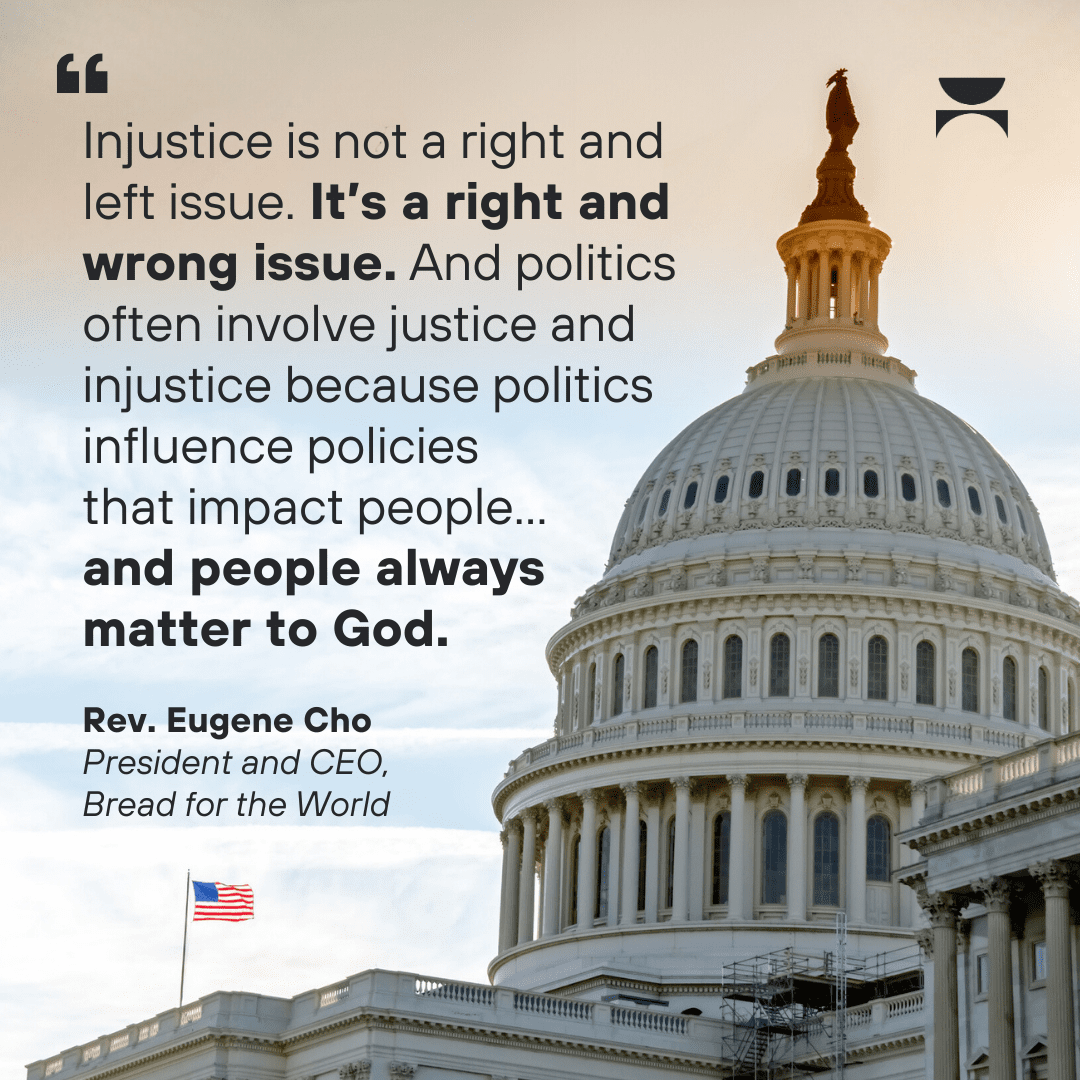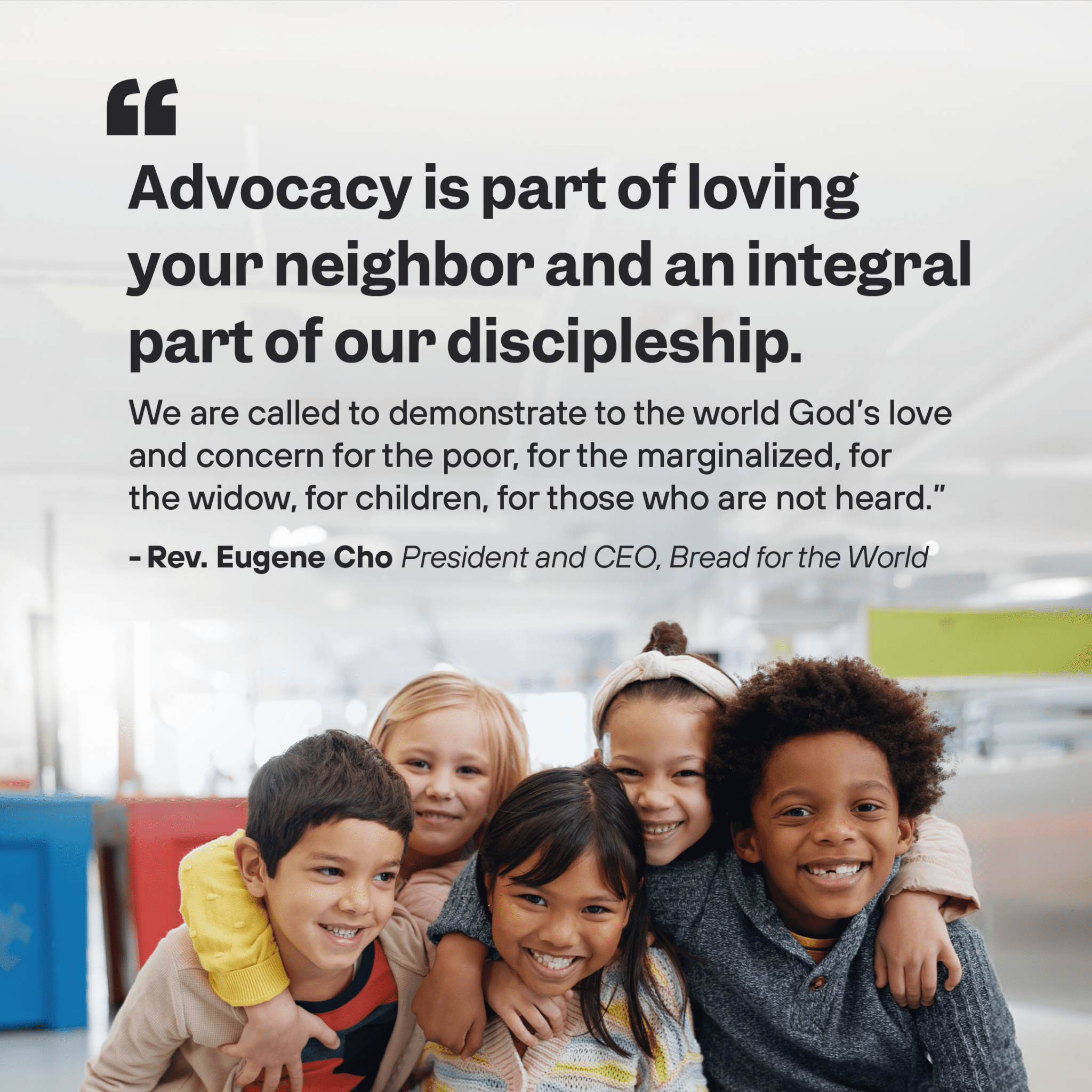Cheri Andes
Deputy Director of State Organizing and Faith Engagement
A Faith-Based Approach to Engaging the 2024 Elections
At Bread for the World, we bring our faith to our civic engagement, whether that is through the electoral process or through our advocacy. Our faith is at the core of who we are, and it is grounded in love—love of God, and love of our neighbors as ourselves. God is revealed to us in Scripture, and we turn to Scripture to ground ourselves in who and whose we are: God’s beloved.
In the Gospels, Jesus displays a particular heart for those who experience poverty, hunger, and vulnerability in our nation and in our world. God is not neutral; God sides with people who are forgotten, marginalized, and oppressed. The greatest commandment is to love the Lord our God with all of our heart, mind, and soul and to love our neighbors as ourselves. We are first called to love. We know love because God loved us first. We respond to our loving relationship with God by loving our neighbors.
We choose to be guided by love as we show up in our congregations, on social media, and in supporting vulnerable people in our communities. It is also about how we show up in public spaces, whether that is in the way we engage presidential or congressional candidates, the way we vote, the way we participate in political discourse, or our advocacy actions. We know that our political decisions impact our neighbors.


The leaders we elect make the decisions for our country. Scripture emphasizes the importance of government in pursuing justice and caring for its people. Joseph served the good of his people through his active participation in the Egyptian political structure of his day (Genesis 41). After the people of Israel returned from exile in Babylon, the governor, Nehemiah, was able to ask the king of Persia to supply resources for the rebuilding of Jerusalem because of his faithful role in the governance of Persia (Nehemiah 2:1-9). Scriptures also show that wise leaders uphold justice and the common good, especially for those who are poor and in need (Psalm 72:12-14). Leviticus 19:15 and James 2:2-4 call leaders to govern without partiality.
In our democracy, as we seek to love our neighbors and God’s creation, we are called to involve ourselves in electing wise and just leaders, including those who are committed to ending hunger. Our country was founded on the idea that “we the people” are responsible for selecting our own leaders. It is from the people that authority is given to those who govern, and so we as Christians should participate in the processes of putting in place the type of leaders called for in Scripture. Because of our democratic election process, constituents can ask questions and receive information about a candidate’s position on issues of hunger and poverty. We can also share that information with our friends and neighbors—to help them cast their votes for wise and just candidates. In this way, we continue in the tradition of the prophets, such as Isaiah and Jeremiah, who called nations and their rulers to account for their behavior.

Through prayer, we’re reminded of our deep connection to God and our collective need for divine guidance. As 1 Timothy 2:1-2 urges, our prayers should encompass everyone, leaders included, paving the way for peace, godliness, and holiness in our lives and communities.
“I urge, then, first of all, that petitions, prayers, intercession and thanksgiving be made for all people—for kings and all those in authority, that we may live peaceful and quiet lives in all godliness and holiness.” – 1 Timothy 2:1-2
In challenging times, just as in the days of early Christians, prayer empowers us to support those in authority with a spirit of love and advocacy. It’s a powerful act that binds us closer to God and to each other, fueling our mission to end hunger. Join us in prayer, and together, let’s create a world where all are fed and cherished.
Dear God, our Creator, through our elected leaders and our government, you sustain all you have made.
We pray especially for people who are seeking election to political offices in our country. Grant them integrity and wisdom to focus on matters that strengthen our government and protect the most vulnerable among us.
Give us courage to challenge candidates to address issues of hunger and poverty. As we prepare to cast our votes, may we be guided by your vision of justice and mercy.
In the name of Christ, we pray. Amen.

We cannot end hunger in the U.S. and globally unless we have leaders in Washington, D.C. who will make it a priority. In addition to the presidential candidates, there are 468 seats in Congress (33 Senate seats and all 435 House seats) up for election in November. This is why it is critical to engage all of the candidates on hunger issues and vote for those committed to taking the lead.
The leaders we elect make decisions that impact people who are experiencing hunger and poverty here in the United States and around the world. Decisive action by members of Congress and the president can help us move toward a world without hunger. Enacting policies and programs that create jobs, strengthen safety nets, invest in human capital development, support community-initiated public-private partnerships, and support international efforts to end hunger and poverty will make a difference.
As believers, we urge congressional candidates to adopt platforms that prioritize these values. In that regard, these are the three questions we submit to our candidates:
1. Attend a virtual or in-person meeting with candidates and read their campaign literature, platforms, and social media posts to learn their positions on measures to end hunger and poverty.
2. Send candidates emails, letters, or other correspondence, or tag them on social media and ask how they will end hunger and poverty.
3. Share information with your friends and family about candidates’ positions on issues of hunger and poverty on social media and in conversations.
4. Volunteer time and contribute resources to candidates who have demonstrated their commitment to reducing widespread hunger and poverty.
5. Learn about the candidates. In order to end hunger, we must elect candidates committed to it. Here are some ways to learn the candidates’ positions on how they would end hunger in both in the U.S. and globally:

“Advocacy is part of loving your neighbor and an integral part of our discipleship. We are called to demonstrate to the world God’s love and concern for the poor, for the marginalized, for the widow, for children, for those who don’t have a voice.”– Rev. Eugene Cho, President & CEO of Bread for the World





The content in the following external resources and websites may not reflect the views or public policies endorsed by Bread for the World.
Bread for the World has a team of organizers ready to help you vote your values. Click on the regional organizers below to find out which one is assigned to your state and then connect with them directly.
Deputy Director of State Organizing and Faith Engagement
Strategist for National Church Partners and Latino Communities
Director of Organizing and Faith Engagement
Progress Team Lead for State Organizing
Deputy Director, Organizing and Faith Engagement
Strategist for Pan African and Orthodox Faith Communities
Explore these resources that help you pray and practice discernment while engaging in the electoral process.
Every dollar you give to support our advocacy helps Bread for the World secure hundreds of dollars in lifesaving assistance for families in the United States and around the world.